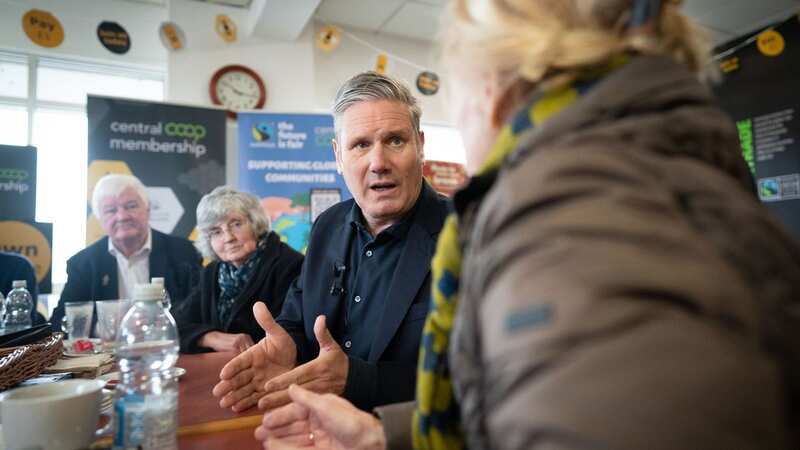

Keir Starmer has said Labour will ditch its manifesto pledge to scrap university tuition fees.
The Labour leader said the party was preparing to "move on" from its commitment to free tuition, which was written into the last two manifestos under Jeremy Corbyn.
Mr Starmer also pledged to retain the policy in his successful bid for the Labour leadership in 2020.
But he said last year that the party is "starting from scratch" after junking many of the Corbyn-era policies, including an end to NHS outsourcing and scrapping Universal Credit.
The decision to axe his vow to scrap £9,250-a-year fees will rile the left wing of the party and risks alienating younger voters.
 Teachers, civil servants and train drivers walk out in biggest strike in decade
Teachers, civil servants and train drivers walk out in biggest strike in decade
 Labour Party leader Keir Starmer and shadow education secretary Bridget Phillipson during a visit to Blackpool (PA)
Labour Party leader Keir Starmer and shadow education secretary Bridget Phillipson during a visit to Blackpool (PA)But Labour strategists are pinning their hopes on showing the party has a firm grip on fiscal discipline.
He told the Today programme: "We are likely to move on from that commitment because we do find ourselves in a different financial situation.
"But I don't want that to be read as us accepting for a moment that the current system is fair or that it is working."
Mr Starmer added: "We are looking at options for how we fund these fees. The current system is unfair, it doesn't really work for students, doesn't work for universities."
The Labour leader is expected to set out more detail in the coming weeks, when he turns his focus to education as part of his key missions for Government.
Labour has been focusing on economy and crime in recent weeks. Mr Starmer is next expected to give a major speech on health before shifting to education, party sources told the Mirror.
The decision sparked anger from left-wing activist group Momentum, who said it would be a "betrayal of millions of young people".
"The Labour Leadership should learn from Nick Clegg's failure, not repeat it," a spokesman said.
"Keir was elected on a promise to abolish tuition fees. With higher education in crisis and young people facing a future of high rents & even higher debts, this pledge is more urgent than ever. Trust matters. Young people matter."
Labour MP Beth Winter, who represents Cynon Valley, said: "Charging young people thousands of pounds a year for a university education, and leaving them with huge levels of debt has been a hallmark of the last 13 years of Tory misrule.
 Richard 'shuts up' GMB guest who says Hancock 'deserved' being called 'd***head'
Richard 'shuts up' GMB guest who says Hancock 'deserved' being called 'd***head'
 Students are being landed in thousands of pounds of debt (stock photo) (Getty Images)
Students are being landed in thousands of pounds of debt (stock photo) (Getty Images)"The Lib Dems also suffered a decade of decline, after abandoning their opposition to tuition fees, when they were in coalition government with the Tories.
"Labour's policy of free tuition is one of the reasons why our party consistently wins more support among young people than the Tory party, which has caused real student poverty during its time in government."
UCU general secretary Jo Grady said the move was "deeply disappointing" as the "broken" model had left students in debt and forced staff into strike action over pay and conditions.
She said: "Keir Starmer repeatedly pledged to abolish the toxic system of tuition fees and in doing so was elected leader of the Labour Party.
"It is deeply disappointing for him to now be reneging on that promise, a move which would condemn millions of future students to a life of debt.
"What we really need is a positive vision for higher education that puts staff and students first."
It comes ahead of Thursday's local elections in England, which marks the first major electoral test for Rishi Sunak as Tory leader.
A new poll for GMB by Survation put Mr Starmer's party 10 points clear of the Tories on 33% to 23%, with the Lib Dems on 18% and the Greens on 11%.
The news will come as a major boost to Labour, which is keen to show is can make gains in key battlegrounds ahead of the next general election.
Polling guru Professor Sir John Curtice said yesterday that a double digit win over the Tories in vote share could show Labour is on course for Downing Street.
Meanwhile, Mr Starmer has reportedly put plans for a post-elections reshuffle on ice.
Speculation had been mounting in Westminster that the Labour leader would shake up his top team but it is now most likely to come in the autumn, according to the Times.